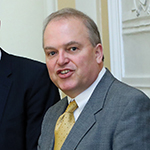Gary Culliton speaks with Bristol oncologist Dr Paul Cornes about the savings that could potentially be made from switching to biosimilar drugs.
A consultation paper on biosimilar medicines is due to be published this month and, following consultations with stakeholders, a national policy on biosimilars will be developed, the Minister for Health has pledged.
Options to be scrutinised are likely to include passing a law regarding drug substitution and interchangeability, according to Bristol oncologist Dr Paul Cornes, who spoke at a recent meeting in Dublin.
Moves away from a controlled market, to a more competitive one that would leverage savings in excess of the 20-to-30 per cent discount that reference pricing achieved were also likely to be considered, he told Irish Medical Times.
Norway — which until recently had the highest drug spend per citizen in the world — had created a competition mechanism involving annual tenders for drugs that offered one possible way forward, Dr Cornes told IMT. “Market forces have not been brought to bear. Many drugs that were launched and approved — and had their trials paid for a decade ago — have had prices rises above inflation year-on-year,” Dr Cornes contended.

Dr Paul Cornes, NHS Oncologist, Bristol Oncology Centre
The oncologist from the Bristol Oncology Centre and former NHS consultant was among the speakers at the ‘Medicine Spending: Value and Reform for Patients and Our Health Service’ meeting organised by the Healthcare Enterprise Alliance — a group representing the makers of generics and biosimilars. He said that the NHS’s switch to just two biosimilars had allowed it to “make savings equivalent to hiring 9,000 additional nurses or a saving of 3.4 per cent on NHS England’s hospital drugs budget”.
The decision to switch to a biosimilar should always be a clinical decision made on an individual patient basis, supported by scientific evidence, and with patient awareness, Oliver O’Connor, the CEO of the Irish Pharmaceutical Healthcare Association pointed out. “In Ireland, doctors may prescribe biologics and biosimilars, and switch if they judge that clinically appropriate. However, by law, it is not permitted for a pharmacist to substitute or switch a doctor’s prescription on biologics or biosimilars.”
Annual sales of drugs that have lost their patent — in the seven countries that are the biggest spenders on medicines — are between $50 and $80 billion (€47-€75bn). Biosimilars have threatened to take a significant slice of this market.
The Dutch Presidency of the EU identified that a sustainable market for biosimilars was a crucial factor in enabling competitive markets to evolve.
In contrast, countries that had gone for controlled markets, such as Ireland and Spain, had set reductions (30% in our case) that were subsequently matched by drug originators. “The originator supplier simply matches the price and drug costs do not fall any further: there is no incentive to drop prices,” explained Dr Cornes.
Indeed, sales of certain biosimilars have been tiny, discouraging manufacturers from launching further products here.
Britain and Germany have been able to create markets that are more sustainable, according to Dr Cornes. Britain has “horizon-scanning procedures” for when patents were due to expire, with the aim of getting biosimilars manufacturers to launch as quickly as they can.
Countries that were large enough to have multiple tenders each year could thus keep several manufacturers in play.
If one of five bidders was not successful in tendering for the London/South East region, another tender may be expected to arise six months later. “The market goes through rounds of gentle price-cutting,” said Dr Cornes. “Britain can thus keep five manufacturers competing one against another.”
In the UK, the price of biosimilars/ biologics had not fallen so low that it was no longer worth producing. Use of white cell growth factor had increased five-fold with biosimilars use, for example, in the wake of discounts achieved in the UK. Although there was no price transparency, the discount must have been at least 80 per cent: oncology service savings also resulted. “There is a difference between controlled and competitive markets. It is clear that 80 per cent savings will not be achieved without market competition,” Dr Cornes told IMT.
Following EU reports, the Dutch EU Presidency proposed that the Low Countries come together to create a tendering market similar to Britain’s. Minister Harris has suggested that Ireland may also be looking at supranational tendering.
Doctors may follow guidance on prescribing the cheapest available medication option or legislation may be passed to make this happen, said Dr Cornes.
Minister Harris has hinted at legislation enabling substitution and interchangeability.
The US has the world’s highest generic drugs usage — not because of doctors’ prescriptions but because the Orange Book (Approved Drug Products with Therapeutic Equivalence Evaluations) enabled pharmacists to substitute for the cheapest version.
The new Purple Book (Lists of Licensed Biological Products with Reference Product Exclusivity and Biosimilarity or Interchangeability Evaluations) will list biological products licensed by the regulator, the FDA, and the drugs can be swapped at pharmacy level. The government’s reinsurers’ approach means only the cheapest product is reimbursed.
In the US, every month the pharmacist may strike a new deal, which brings pharmacy wholesalers into play – creating competitiveness.
Research shows that once there are five competing manufacturers, further market entrants do not influence the price further, Dr Cornes added.
Australia also has permitted substitution by pharmacists. Their ‘a’ flagging was a version of America’s Purple Book.
Legislatively, Dr Cornes believed Ireland had the power to do the same through the HPRA — thus paying the cheapest price — and the current consultative process was due to consider whether this might be appropriate.
The post Biosimilars consultation due appeared first on Irish Medical Times.